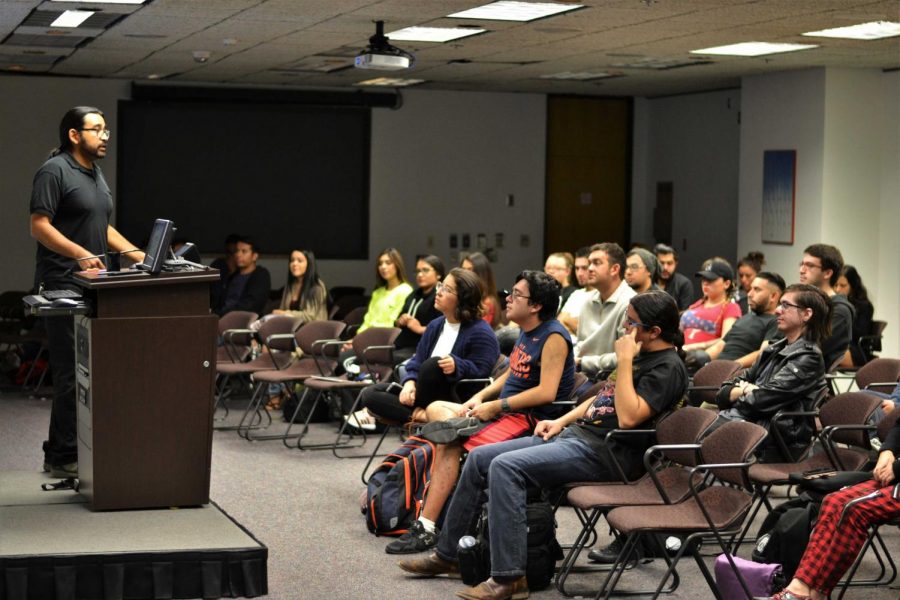As part of the International Cultural Lecture series,Ramón Villa-Hernandez, UTEP media production professor and film artist, shared a sneak peek of his upcoming film “Juana Doe” at the Blumberg Auditorium on Thursday morning.
“Juana Doe” is an evidence-based narrative that tells the story of the thousands of immigrants who try to cross the border, disappear and are buried in mass graves. This film humanizes the work of the forensic anthropologists’ who focus on finding the identity of the skeletons found in the mass graves across the U.S.-Mexican border.
“These people are buried in mass graves because there wasn’t a way to identify them,” Villa-Hernandez said. “The story is a narrative on how the dead speak to the forensics to give the dead a voice.”
At a very young age, Villa-Hernandez discovered his passion for film. Born and raised in Los Angeles, it was the exposure to different cultures what became a major influence on his storytelling.
“As a child I hanged out with a club of boys and girls to watch movies, one day one of the guys in charge of the club brought a video camera, that summer I started to shoot short films and have fun with it,” Villa-Hernandez said.
Villa-Hernandez said that as a child growing up in L.A., the diversity of film was a major influence in his work, as his access to Spanish, Korean, German, and Chinese films helped him to understand the concept of film.
“In Los Angeles, they have movie theaters with Spanish films, and here in El Paso everything is in English,” Villa-Hernandez said. “It was such a weird thing that they didn’t want to speak Spanish even though they lived right across Mexico.”
With more than 20 years of experience in the film industry, Villa-Hernandez has worked on various projects besides “Juana Doe.” Some of his most renown projects are “Reservado” (2010) a short film that premiered at the Cannes Film Festival in Cannes and “Los Chidos,” (2012) a short film that premiered at the 2012 SXSW Film Festival in Austin, TX.
“I worked as a writer, director and producer so I got to know the industry, however, the films industry wants to tell one same story, and I wanted to do tell my own stories,” Villa-Hernandez said. “I wanted to make movies I want to see on the big screen, movies about the border culture.”
Villa-Hernandez said that nowadays the media dehumanizes the border community, especially with new racist administration.
“I want to make a connection with those ethnicities that are marginalized,” he said.
The pre-production of “Juana Doe” began last year after the backlash of criticism towards Mexicans.
“I couldn’t believe that the United States was generalizing Mexicans as criminals and murderers, especially when they said it without thinking about the consequences,” Villa-Hernandez said. “I know Mexicans who are hard workers and good people, and they become invisible in this country because of the fear of being deported, that is why I decided to tell what is the real story about the immigrants here in the United States.”
In his film, “Juana Doe” Villa Hernandez portrays the importance of the new techniques and technological advances the forensics have worked on.
“The forensic anthropologists are working in creating a DNA bank as a way to catalog these bodies,” Villa-Hernandez said. “This way if people want to find the body of their relative they can get a DNA test and see if their DNA matches the sample from one of the cataloged bodies.”
For Villa-Hernandez, the challenge is not only the creation of the story but the cost of it. Villa-Hernandez has created a campaign to invite the El Paso community to support this film.
“The campaign is to invite the community to create a movie about the immigrants, their life, and their death,” Villa-Hernandez said. “I want to have a conversation with people about the importance of why we need to discuss this topic.”
To know more about “Juana Doe,” visit the website https://juanadoe.com









